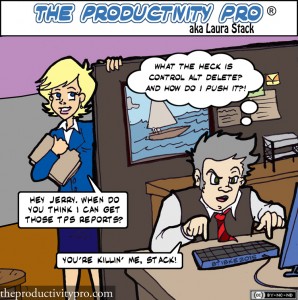 When it comes to poor productivity, the guiltiest party is often the last person to know—because no one tells them. Sometimes it’s because their coworkers don’t want to cause trouble or get in an argument. Other times they work around the unproductive teammate, because it’s easier that way. What if you’re the one guilty of ruining your team’s productivity, and you don’t realize it? It’s kind of like having broccoli in your teeth—you wish someone would tell you, before you embarrass yourself.
When it comes to poor productivity, the guiltiest party is often the last person to know—because no one tells them. Sometimes it’s because their coworkers don’t want to cause trouble or get in an argument. Other times they work around the unproductive teammate, because it’s easier that way. What if you’re the one guilty of ruining your team’s productivity, and you don’t realize it? It’s kind of like having broccoli in your teeth—you wish someone would tell you, before you embarrass yourself.
Though other factors may contribute, as Patrick Lencioni points out in his book The 5 Dysfunctions of a Team, it ultimately boils down to an absence of trust. In Lencioni’s fable, the person doing this most was a brilliant marketing VP named Mikey. She rolled her eyes at her executive team’s ideas, made scathing and insulting remarks, and made no bones about her personal work team being more important to her than her executive team. The CEO eventually asked her leave the company.
You’re probably not like Mikey, but you can inadvertently ruin your team’s productivity without realizing it. Here are some of the biggest complaints I hear from audience members you might need to consider:
1. Constant griping. If you don’t like your work or the way your company is run, your co-workers don’t need to constantly hear about it. Discuss your issues in private with those who can initiate changes: your superiors. Don’t waste your team’s time or bring everyone down with your negativity.
2. Bottlenecking. Other people on the team depend on you to finish your work, so they can complete theirs. If your work is piling up, and you’re slowing down the team, roll up your sleeves and get moving. Discuss with your manager the possibility of getting some temporary help, outsourcing a few tasks, or readdressing priorities.
3. Not communicating your needs. Tell people in all directions exactly what you want and need from them to stay on track and keep from slowing down the team. Give people plenty of advance notice on upcoming deadlines. Don’t tell people what they want to hear—tell them what you can do. It’s better to set realistic expectations than take on too much and be late.
4. Doing things by hand or using old technology. As much as you might prefer old ways of doing things, it can slow folks down. I know a writer who just graduated to Word 2010 and HTML mail, because he was more comfortable with the old ways. But his old technology was slowing others down. One salesperson liked his paper calendar but didn’t keep his Outlook calendar up-to-date. When others made appointments, he would decline, citing a conflict, which frustrated his team members and wasted everyone’s time rescheduling.
Stepping Up to Bat
If you’re part of a team, work hard to be an effective team member—or start your own company. Think about how changing your ways might help your entire team speed up!
© 2015 Laura Stack. Laura Stack, a.k.a. The Productivity Pro®, helps professionals achieve Maximum Results in Minimum Time®. For over 20 years, her keynote speeches and workshops have helped leaders boost personal and team productivity, increase results, and save time at work. Laura is the author six books, most recently Execution IS the Strategy. Widely regarded as one of the leading experts in the field of performance and workplace issues, Laura has been featured in the Wall Street Journal, the New York Times, and USA Today. Connect via her website, Facebook, or Twitter.


